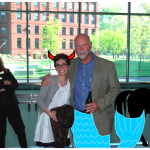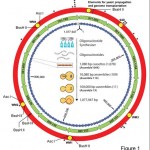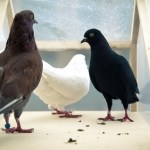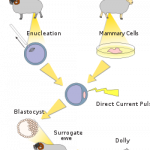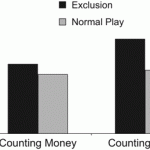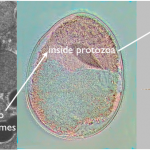Research
There is an interesting and very thoughtful piece by Craig Venter and Daniel Gibson in today's Wall Street Journal going through what their breakthrough is and what it isn't, where they see the project going in the future, and why public discussion is important:
[Previous genetic engineers] did not create life in a test tube, nor did we create life from scratch. We transformed existing life into new life. We also did not design and build a new chromosome from nothing. Rather, using only digitized information, we synthesized a modified version of the naturally occurring Mycoplasma mycoides…
The reaction to the Venter Institute's synthetic genome transplantation has been decidedly mixed. Is this the beginning of something new and wonderful, the ability to really design organisms from scratch? Is it something more sinister, the beginning of a dark era where techno-corporate (or terrorist) interests can design something that will destroy the environment in catastrophic ways? Is it just a technical advance or a conceptual breakthrough? A philosophical revolution? Is it a Big Deal or big whoop? Synthetic biology has never been just one thing and still has many different goals, with a…
The J. Craig Venter Institute has just announced the creation of the first bacterial cell controlled by a genome that is entirely chemically synthesized (PDF). The group has been working towards this goal for several years now, first working out how to synthesize and assemble such large pieces of DNA and how to transplant a genome from one organism to another. This result puts it all together, a synthetic version of the genome of the bacterium Mycoplasma mycoides and transplantation into a Mycoplasma capricolum cell. This synthetic cell is almost identical to a natural M. mycoides, but also…
I'm sure by now you've heard about inattentional blindness, as I've posted about it a million times since this blog began. It's an amazing effect! It shows us that we really aren't as aware of the world as we think we are. If you haven't heard about it by now I encourage you to go right here to try out a demo on yourself! Inattentional blindness isn't the only time this happens though, there are a number of cognitive illusions that make you realize you're a lot stupider than you thought you were.
There's a brand new book out today by the semi-discoverers of inattentional blindness (well…
Are aliens little green men of unpredictable motives? Horrible insect-like face-hugging, chest-exploding monsters? Are they super-smart, super-slimy, super-fishy, body-cavity-probing, disc-flying creatures, searching for planets to colonize and people to destroy as Stephen Hawking warned, or are they something much more mundane? Could there be alien life already on earth, too microscopic, too different to notice? Could life on earth have been seeded from an alien land, with secret messages encoded in our DNA? We've been scanning the sky for extraterrestrial radio signals for years, should we…
John M. Peters, MD, DSc, MPH, the Hastings Professor of Preventive Medicine at the USC Keck School of Medicine passed away at age 75 on May 6 from pancreatic cancer. The School's dean, Carmen A. Puliafito, said
"one of the legends of environmental and occupational health. His work took him from the freeways of Los Angeles to the tire factories of Akron to the granite mines of Vermont. The focus of his research was to investigate and quantify environmental risks and then contribute to strategies to mitigate that risk in the workplace and in everyday life."
My dear friend and former deputy…
Dichloroacetate or DCA is a small molecule that has been in the press over the last four years due to its potential to inhibit aerobic glycolysis in cancer cells. The cells from each of us usually produce energy in the form of ATP from a variety of nutrient sources plus oxygen using a very efficient process called oxidative phosphorylation. However, when oxygen is partly depleted, such as in skeletal muscle when exercising strenuously ("going anerobic"), energy is produced from glucose by a far less efficient process called glycolysis. Glycolysis is the most primitive form of cellular…
I'm a little late in posting about the recent work of Tuur Van Balen, a Belgian designer who uses art and design to explore the boundaries between people and technology. His work has explored synthetic biology and biotechnology for years, and I first was introduced to his work through news of his Urban Biogeography project. A recent focus in synthetic biology has been the design of simple biosensors, strains of bacteria or yeast that can sense an environmental pollutant and produce a measurable output such as color change. Thanks to the work of several very creative iGEM teams, the Registry…
I did not turn on the computer yesterday (yes, it was glorious) so I missed Mother's Day coverage in our local newspaper. When we returned home, I was happy to see that on the front page of the print copy the dean of Duke School of Medicine, Nancy Andrews, MD, PhD, was featured with her daughter in the lab on their fun Saturdays together.
Also cited and pictured in the article was Duke vice dean for research and professor of pharmacology and cancer biology, Sally Kornbluth, PhD, and her daughter.
Written by News & Observer science editor Sarah Avery, the article describes how women are…
As many of you probably know, when I am not working in the lab or posting here at Obesity Panacea I am also a content editor at ResearchBlogging.org. Each weekday a different Research Blogging editor selects their favourite posts from the past week in their area of expertise, and you can find my favourite posts on Health and Clinical Research here every Wednesday. Since there are always great Health-related posts on Research Blogging that don't necessarily overlap with obesity/fitness/nutrition, I don't usually cross-post my Research Blogging selections here on Obesity Panacea. But this…
Way too much, according to a recent study by Johnson and colleagues, published in the Archives of Internal Medicine.
Personally, I love salty foods. While I have never been too fond of sweet things (chocolate, candy, etc.), just a few years ago I could have easily gone through a bag of chips or pretzels in one sitting. Just writing about that crunchy/salty goodness makes my mouth water.
However, since hypertension runs in my family, I have recently made a concerted effort to limit my sodium intake - largely by cutting out my intake or salty snacks. This process was made that much easier by…
This week I will be heading to the International Congress on Physical Activity and Public Health in Toronto, Ontario. It should be a terrific conference - the program includes presentations by friends of Obesity Panacea including Drs Jen Kuk and Meghann Lloyd, not to mention other internationally renowned physical activity researchers like Steve Blair, Peter Katzmarzyk and Neville Owen. There will also be a large number of oral and poster presentations on a variety of topics by my own lab group, including my own poster ("Relationship between daily steps and clustered…
Many people in synthetic biology, including myself and much of my lab, are working on using biology to make things more efficiently, renewably, and sustainably. Being able to make plastic replacing biomaterials, chemicals, medicines, and fuels in living cells from renewable resources (especially in photosynthetic organisms that need only sunlight and water) will undoubtedly decrease our dependence on fossil fuels and with a lot of work in policy and process and infrastructure engineering may one day become truly sustainable. It's difficult to not notice, however, how unsustainable most…
The following is a rather curious promotional video that was shown at the plenary sessions of the AACR 2010 meeting. I first saw it yesterday, and thought my readers might be interested in it while I'm winding my way home:
It's basically a compendium of various facts about cancer and cancer research with a rather obnoxious techno soundtrack to make it "hip" in the way that middle-aged white guys think is "hip." (Believe it or not, the AACR actually played this loud enough to feel the bass.) Annoying music aside, though, the graphics in the video compellingly boil down a large amount of…
Light interacts with and controls biological systems in diverse and fascinating ways. Our eyes are made up of thousands of cells that respond to light, sending signals to our brain as light in different colors and shapes moves across them. Photosynthetic cells are full of receptors that can sense and respond to many wavelengths of light, allowing cells to absorb light for photosynthesis, but also to move towards areas of more sunlight and know when the seasons are changing. Synthetic biology takes these light-responsive systems as parts that can be recombined, shuffled and integrated into…
New in vitro fertilization technology is making it possible for someone to have two moms--one that provides the genome in the nucleus of the cell, and one that provides the rest of the egg cell, including the mitochondria. Since all mitochondria are passed down from the mother in the egg (sperm are just too small to provide anything but the father's genetic material to the fertilized embryo), transplanting the nucleus from a fertilized embryo to an egg from a different woman can bypass the transmission of any mitochondrial diseases that the mother carries. Because mitochondria have their own…
While reading through the science news headlines today, I came across a very interesting one from the Telegraph: "Handling cash 'better at killing pain than aspirin', study claims."
Intrigued, I sought out the paper mentioned in the article. It turns out it wasn't published recently at all - it was published last year in June. Of course, they were probably fooled by the fact that the University of Minnesota just published a press release on it. Regardless, the real question is whether money was truly more effective than painkillers at preventing pain. So what did the researchers find?
The…
My two great thesis project loves are hydrogen and symbiosis, and as such, the recent news of a multicellular organism that lives in a completely oxygen free environment and gets its energy from hydrogenosomes instead of mitochondria is totally fascinating.
Hydrogenosomes are organelles that are evolutionarily related to mitochondria. Mitochondria generate energy for the cell by transferring electrons pulled off of sugars molecules to oxygen (this is why we breathe oxygen). The energy from this electron motion is transferred to the production of ATP, the energy currency of the cell, through…
I don't have the attention span to write this article.
In the course of penning this introductory paragraph, I've taken umpteen email breaks, gotten distracted by several Wikipedia wormholes, and taken an hour's time out to watch Frontline documentary clips on YouTube. It has taken me, in toto, seven days to write a five-paragraph article about my generation's decreasing attention span. At least the irony isn't lost on me.
A social researcher tracking my movements across the web might discover that, in the words of University College of London professor and director of CIBER (the Centre…
Last week's issue of Nature focused on the progress (or lack thereof) in genomics and related fields since the Human Genome Project (HGP) was completed ten years ago. In many ways, the era of genomics has yet to fulfill many of the promises made twenty years ago, but the investment in science and technology has at the same time made a valuable impact on many fields in basic science. Understanding this recent history of the genomics bubble is crucial to how we approach current science and technology investments in areas such as personal genomics and importantly, synthetic biology.
In a…
